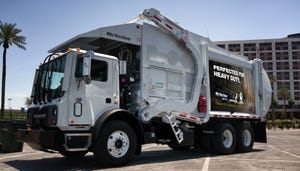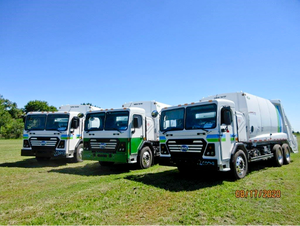TRANSPORTATION: Lightweight Fleet Converted To CNG In Argentina
September 1, 1994
Christine Combs
Natural gas is becoming the fuel of choice at Waste Management In-ternational's MANLIBA subsidiary in Buenos Aires, Argentina.
MANLIBA, which provides solid waste services to the municipality of Buenos Aires, has been gradually converting its lightweight vehicle fleet from leaded gasoline to compressed natural gas (CNG) over the past five years. Today, 65 pick-up trucks operate on the clean-burning fuel.
MANLIBA designed the truck conversion as a volunteer project for the city council's Atmospheric Control Plan. Since the carbon mo-noxide level in Buenos Aires often exceeds the maximum allowable level of 9 parts per million, one of the plan's objectives is to reduce air pollution.
Natural gas in Argentina is a clean, abundant energy source, composed mainly of methane (ap-proximately 80 percent), ethane (15 percent), propane (4 percent) and butane (1 percent). Exhaust gases from burning compressed natural gas are lead-free and low in particulates, carbon monoxide, sulfur dioxide and nitrogen oxide.
The switch to compressed natural gas has reduced the fleet's ex-haust emissions of toxic gases, metals and particulates were substantially reduced (up to 80-fold) and reportedly eliminated lead pollution.
"These results greatly reduce any adverse effects on the atmosphere created by vehicle exhaust. The project has achieved significant en-vironmental and economic im-provements for our local people, customers and company," said Juan Jose Sandri, MANLIBA purchasing manager.
Natural gas, which is cheaper than gasoline, is also in good supply in Argentina. MANLIBA's re-sults have shown that compressed natural gas costs about 60 percent less than regular gasoline and an-nual savings have been estimated at approximately $3,700 per ve-hicle, based on operating at 200 km per day (see chart).
Maintenance costs of the CNG vehicles are lower than gasoline-powered trucks, said Roberto San-tos, MANLIBA operations manager. With compressed natural gas, en-gine oil and filters are changed ev-ery 90 days as opposed to every 45 days with gasoline. Spark plugs can last for 18,000 kilometers versus 12,000 kilometers with gasoline and CNG reportedly does not cause exhaust pipe mufflers to rust. Reducing gasoline filter and carburetor repairs have brought further savings, according to San-tos. By conducting less maintenance, on-site waste generation has also been reduced by 50 percent.
Converting from gasoline to CNG involves modifying the carburetor, adding two gas storage tanks and installing valves and switches. The total costs average to approximately $1,100 per vehicle.
Certified contractors conduct the conversions and Argentina's Ente Nacional Regulador del Gas regulate the use of natural gas as vehicle fuel. A number of safety standards and technical specifications are required to complete installation and verification tests. MANLIBA's vehicles also are reviewed by a certified contractor on a regular ba-sis.
The environmental results a-chieved by MANLIBA's project earned the subsidiary the first Chairman's Award for Environ-mental Excellence presented by WMX Technologies Inc., Waste Management International's parent company.
MANLIBA is presently evaluating conversions for heavier vehicles. The company is also conducting a research study to assess the feasibility of using CNG in other applications.
You May Also Like


